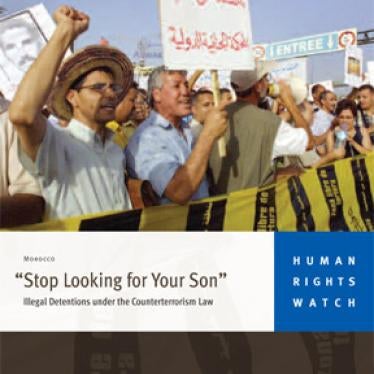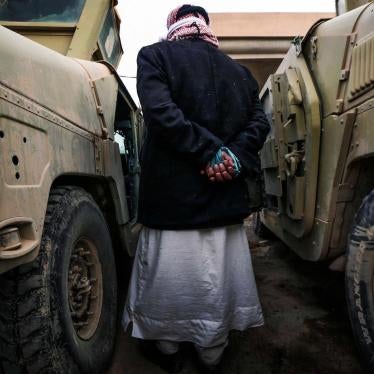(New York) - The bombing in Marrakesh on April 28, 2011, was a heinous attack on the population and an assault on basic human rights, Human Rights Watch said today. The attack, the deadliest in Morocco in eight years, killed at least sixteen people and injured nearly two dozen others.
No one has publicly claimed responsibility for the blast, to Human Rights Watch's knowledge.
"The bombing of a café in Marrakesh is an indefensible assault on the right to life," said Sarah Leah Whitson, Middle East and North Africa director at Human Rights Watch. "There is never any justification for such abhorrent attacks."
The explosion ripped through the Argana Café, a popular tourist site in the historic Djemma el-Fna Square, killing at least five Moroccans and eleven foreigners. A government statement said King Mohammed VI had instructed the interior and justice ministers to investigate the blast promptly while "committing to the rule of law and the preservation of peace and security."
While pursuing those responsible, Moroccan authorities should heed the king's directive to do so in accordance with the law and not commit the grave abuses against suspects that have characterized the country's counterterrorism operations in the past, Human Rights Watch said.
Human Rights Watch has documented numerous human rights violations against terrorism suspects in Morocco, including arbitrary arrest and detention, torture during interrogations, forced confessions, and convictions after unfair trials. These abuses violate the progressive legislation Morocco adopted in 2006 to safeguard against torture, as well as international human rights treaties that Morocco has ratified.
Many of the abuses took place under Morocco's counterterrorism law, enacted 12 days after coordinated suicide bombings in Casablanca on May 16, 2003, that killed 45 people. The government blamed two Islamist groups: Sirat al-Mustaqim and Salafia Jihadia, a loose alliance of militants in Morocco and other Maghreb countries accused of links with al Qaeda. Hundreds of additional terrorism suspects were arbitrarily arrested following further suicide bombings in 2007.
Six weeks ago, the king pledged a process of political reform, after Moroccans took to the streets to demand checks on his extensive powers, among other changes. The king announced that a committee would draft constitutional reforms to give the prime minister greater power, decentralize power toward the regions, recognize the diverse components of Moroccan identity, including Amazighité (Berber identity), and implement the recommendations made in 2006 by the Equity and Reconciliation Commission, Morocco's truth commission.
On April 14, the king pardoned and freed scores of people imprisoned on politically motivated charges, commuted the death penalty for five people, and reduced prison terms for fifty three other prisoners in what the National Human Rights Council described as a prelude to a comprehensive review of political prisoner cases in Morocco. The majority of those freed or whose sentences were reduced were considered to be close to Salafist Jihadism, which advocates a return to what its followers consider to be Islam's fundamental tenets. Some, but not all, Salafist Jihadists justify violence in pursuit of their beliefs.
Morocco has been hit by a number of politically motivated attacks since 1994, when suspected Islamist militants invaded the Atlas Asni Hotel in Marrakesh and shot dead two Spanish tourists. The coordinated blasts that killed 45 people in 2003 in Casablanca were followed by a series of smaller attacks, including in 2007, when two suicide bombers blew themselves up near the US cultural center and consulate in Casablanca.
"Moroccan authorities will understandably be under immense pressure to find and prosecute those responsible for this horrific attack," Whitson said. "But authorities also need to make sure that they do not repeat the abuses of the past or stall overdue reforms in their rightful quest to bring the perpetrators to justice."







